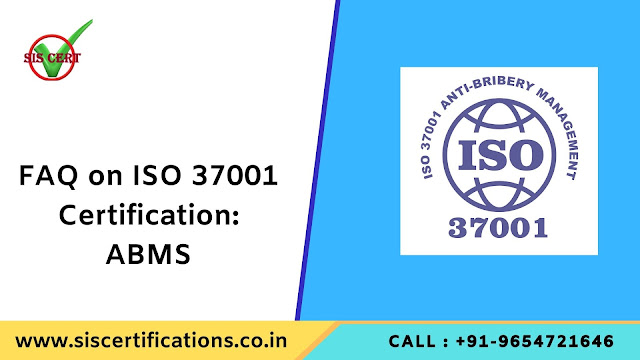FAQ on ISO 37001 Certification: ABMS
The
expressions "HLS" and "Extension SL" allude to the
significant level structure, indistinguishable center content, normal terms and
center definitions for use in the board framework measures (MSS) set out in
Annex SL to the ISO Directives Part 1 2016 (seventh version).
ISO – GENERAL
- Who is ISO Certification and what is a Standard?
ISO
is an autonomous, non-legislative global association situated in Geneva,
Switzerland with a participation of 165 national standard bodies. It has
created and distributed more than 20,000 worldwide gauges of which the most
notable are ISO 3166 – Country Codes, ISO-4217 – Currency Codes and, in the
field of the board frameworks, ISO 9001 Certification – Quality Management. More data about
ISO and its Standards.
- What is a Management-System?
An
administration system is the manner by which an association deals with the
between related pieces of its business so as to accomplish its destinations.
These goals can identify with various topic, including item or administration
quality, operational effectiveness, ecological execution, health and security
in the working environment and some more.
- How are standards developed According
to ISO GuideLine ?
For data on how Standards are grown, if it's not too much
trouble see. please see.
- What is “certification”?
Certification is the
arrangement by a free group of composed Certification (a certificate) that the product,
administration or system being referred to meets explicit necessities.
Certification
can be a valuable apparatus to include validity, by showing that your product
or administration meets the desires for your clients and different partners.
For certain businesses, confirmation is a lawful or legally binding necessity.
- Does ISO certify Company to its Standards?
ISO
develops worldwide measures, yet doesn't perform certification and doesn't give
accreditations. This is performed by certification bodies outer to ISO, along
these lines an association can't be Certify by ISO. Notwithstanding, ISO's
Committee on Committee on Conformity Assessment (CASCO) has created various
principles identified with the accreditation procedure, which are utilized by ISO
certification bodies.
- What is ISO 37001
Certification?
ISO 37001 Certification Anti-Bribery Management Systems (ABMS) – Requirements with
Guidance for Use was intended to enable an association to build up, actualize,
keep up and improve an enemy of renumeration consistence program. It
incorporates a progression of measures and controls that speak to worldwide anti-bribery
great practice.
- Why was ISO 37001 Certification proposed and developed?
Bribery
is one of the world's generally ruinous and challenging-issues. With over US$
1-trillion offered in incentives each year*, the outcomes are calamitous,
lessening personal satisfaction, undermining the standard of law and
government, expanding neediness and disintegrating open trust. For
organizations, bribery can devastate worth and cause mischief to people and
outside partners. *source: OCDE/OECD
However
regardless of endeavors on national and universal levels to handle bribery, it
stays a noteworthy issue. Perceiving this, ISO Certification has built up
another standard to assist associations with battling pay off and advance a
moral business and authoritative culture.
- Are there other ISO standards related to ISO 37001 Certification (ABMS)?
Yes. Some of the Standards related to ISO 37001 Certification
include:
·
ISO 19600
Compliance management systems - Guidelines
·
ISO 26000
Guidance on Social Responsibility
·
ISO 31000
Risk Management - Principles and Guidelines
Dissimilar
to these Standards which state rules that can be utilized uninhibitedly as
direction, ISO 37001 Certification builds up prerequisites for consistence with
the Standard, which empowers an association to seek after affirmation, whenever
wanted.
- Is compliance with ISO 37001
Certifications (ABMS) mandatory?
By and large, no. It is an intentional standard that an association
can receive, whenever wanted. Be that as it may, it is workable for consistence
with the Standard to turn into a lawful or authoritative necessity for specific
associations or ventures. Models may incorporate open acquisition and supply
chains.
- What types of bribery does the Standard address?
With
the end goal of the Standard bribery is characterized as the contribution,
promising, giving, tolerating or requesting of an undue bit of leeway of any
worth (which could be monetary or non-money related), straightforwardly or by
implication, and regardless of location(s), infringing upon pertinent law, as
an actuation or award for an individual acting or abstaining from acting
comparable to the exhibition of that individual's obligations.
This
definition is extensively in accordance with the meaning of bribery utilized in
global instruments and is additionally educated by a reference to the law
explicitly material to the association; it remembers the gift of authorities
for both people in general and the private segments.




Comments
Post a Comment